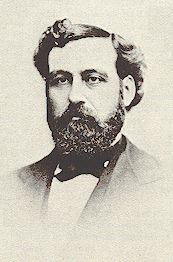In one of the temperance meetings connected with Mr. Moody’s revival labors in Chicago [Illinois], a very intelligent reformed drunkard attributed his reform to the influence of this hymn.
He confessed that it was difficult to speak about past experiences especially when a man had been a heavy drinker, as he had been for sixteen years. He began sixteen years before by taking his first bottle of ale in the back room of a country store, and then, entering the army, he had plunged into dissipation, from which he thought at first he could free himself; but as the years went by, he found the habit had become so strong that he couldn’t control it, for it controlled him.
He had stood at the mouth of the cannon, in front of the fixed bayonet, with the muzzle of a pistol right before him, and yet never had felt there such heart-sinking as he experienced when he began to realize what a man was, fettered by his vice.
He came to this city some little time ago and spent most of his days and nights in drinking and playing cards, sometimes drinking thirty or forty drinks a day. While in this condition one night he came to the Tabernacle out of curiosity, to hear what was being said, and to see what was being done.
He sat in the gallery, and was shielded by one of the long wooden pillars that upheld the roof. He saw the crowds enter with happy faces, and apparently light hearts, and nice clothes, and it hardened his heart, for he felt that he could never be like them. Then he heard Mr. Sankey sing the hymn What Shall the Harvest Be?…And then, said he…it roused me from my stupor. It brought me to feel what my own condition was…
During the recital of these lines, the speaker’s voice trembled, his whole frame was agitated, his words and manner were impressed on his auditors, many of whom were moved to tears, and sobbing was audible in many parts of the great hall.
He then want on to say that that night he had listened to this hymn, describing his own experience, he found no rest; the words seemed to meet him wherever he went…They were written on the walls of the room in the hotel where he boarded. They haunted him wherever he went. He tried to drown the voice by drinking heavier, but he couldn’t remove them. There they were wherever he turned…
He left the Tabernacle saying to himself he would never return; but finally, such was his unrest, he went into the inquiry-room, and talked with Mr. Farwell and Mr. Brewster, and after a great struggle he gave himself to Christ. He trusted in the salvation wrought out for him, and though he had lost position, family, by the accursed cup, he rejoiced that God had looked down on him and saved him.
Crafts, pp. 37–40
